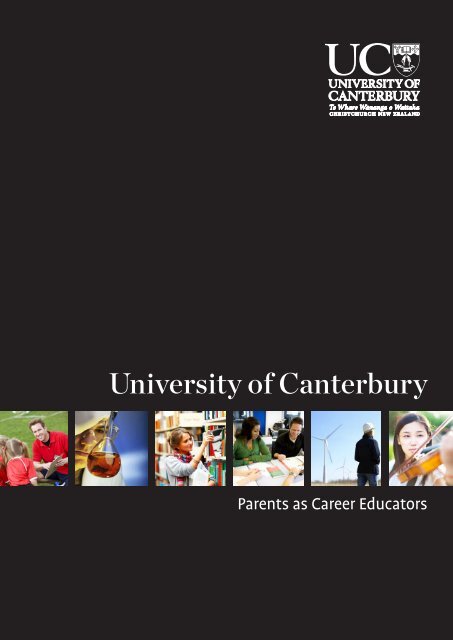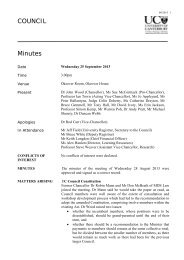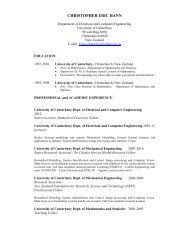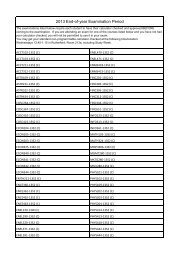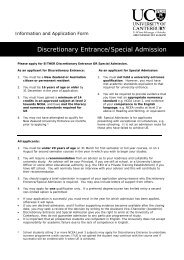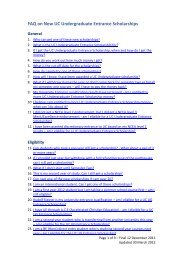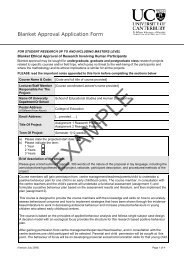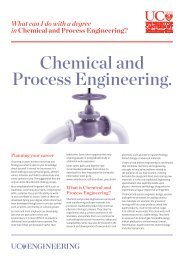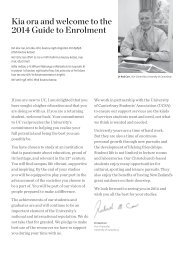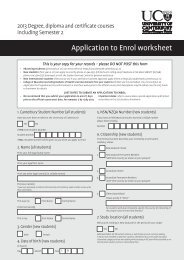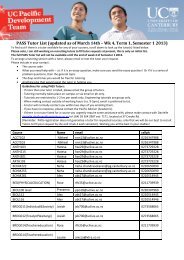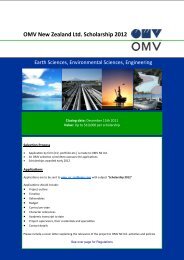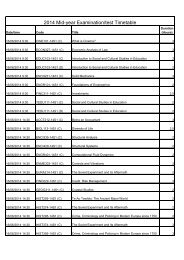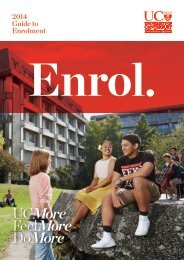Career Decision Making - University of Canterbury
Career Decision Making - University of Canterbury
Career Decision Making - University of Canterbury
You also want an ePaper? Increase the reach of your titles
YUMPU automatically turns print PDFs into web optimized ePapers that Google loves.
<strong>University</strong> <strong>of</strong> <strong>Canterbury</strong><br />
Parents as <strong>Career</strong> Educators
Parents as <strong>Career</strong> Educators<br />
Every day, we are reminded <strong>of</strong> the need in New Zealand for a multi-skilled workforce. Many parents want to help<br />
their children make the right career and training decisions.<br />
What Skills and abilities do<br />
you need<br />
Listening skills:<br />
Able to listen uncritically and patiently,<br />
and not rush to solutions<br />
Guiding ability:<br />
Able to suggest ideas without forcing<br />
them into one direction<br />
Asking ability:<br />
Able to ask questions that will help<br />
your children think about themselves<br />
(their interests, sports, hobbies and<br />
academic subjects)<br />
Lateral thinking ability:<br />
Able to see the links between jobs,<br />
between skills and jobs, and between<br />
interests and jobs<br />
Assessment ability:<br />
Able to assist in assessing the<br />
information collected, using categories<br />
such as “really interested”, “it’s OK” and<br />
“not really my thing”<br />
A ‘sounding board’:<br />
Able to help your family talk or work<br />
through various ideas<br />
Encouragement skills:<br />
Able to support and encourage your<br />
children to do the necessary research to<br />
come to a good, informed decision<br />
Some points to remember<br />
We are <strong>of</strong>ten limited by our own<br />
experience. There are hundreds <strong>of</strong><br />
different sorts <strong>of</strong> jobs that we have<br />
never heard <strong>of</strong>, let alone considered.<br />
Try to cast your child’s net as wide as<br />
possible to give the greatest choice.<br />
Don’t discourage with comments like:<br />
“You’re not bright enough to do that” or<br />
“I thought you hated that subject”. It’s<br />
amazing what people can achieve when<br />
they want something, and many people<br />
are “late career developers”, growing<br />
into skills as they get older.<br />
Most importantly <strong>of</strong> all, encourage your<br />
children in all aspects <strong>of</strong> their lives –<br />
school, home, hobbies, sport and parttime<br />
employment. The greatest gift you<br />
can give them is a belief in themselves.<br />
NO CAREER DECISION IS FINAL OR<br />
FATAL! It’s OK not to know! A career is a<br />
journey, not a destination, so let’s enjoy<br />
the trip!<br />
Helpful Hints<br />
• Ask your child questions that will<br />
help them to look at themselves.<br />
Focus on their interests, things<br />
they are good at, and their personal<br />
values about work.<br />
• If your child doesn’t know what<br />
career they want, ask then to define<br />
broad areas <strong>of</strong> interest, such as<br />
helping people, or scientific work.<br />
Then encourage them to investigate<br />
lots <strong>of</strong> options within each field.<br />
Pursuing work or study in an area<br />
<strong>of</strong> interest is vital for maintaining<br />
satisfaction and getting through<br />
tough times.<br />
• Discuss what your child needs or<br />
wants from their career. Attitudes<br />
to the need for money, security, or<br />
self-development vary from person<br />
to person.<br />
• Try not to impose your ideas,<br />
but help by using questions that<br />
will clarify the issues. i.e. “This<br />
job doesn’t have much physical<br />
activity in it, and you’ve said that’s<br />
important to you. How much will<br />
that matter”<br />
• Point your children towards sources<br />
<strong>of</strong> information about careers and<br />
let them follow up. Encourage them<br />
to see their <strong>Career</strong>s Advisor and to<br />
look at websites like<br />
www.canterbury.ac.nz/careers or<br />
www.careers.govt.nz.<br />
2 Parents as <strong>Career</strong> Educators, 2012
• Ask about the career Education<br />
programme at school and urge<br />
your child to take part in work<br />
exploration, STAR or Gateway<br />
programmes or any tertiary visits<br />
that are available. These are a great<br />
opportunity to find out what a job<br />
or training course is really like.<br />
• Encourage your child in any activity<br />
that develops skills. Many <strong>of</strong> the<br />
important transferable skills that<br />
employers look for are developed<br />
at school through the general<br />
curriculum. Skills are also gathered<br />
from part time or holiday jobs and<br />
from leisure or sporting activities.<br />
In the workforce, what people can<br />
do is <strong>of</strong>ten more important than<br />
the knowledge they hold.<br />
• Discuss subject choice with your<br />
child each year. Which subjects will<br />
best suit their plans for the future<br />
Do you agree with their reasoning<br />
If you have concerns, sit down<br />
with their teacher, careers advisor<br />
or other staff, and find out what<br />
they think. Does the school know<br />
something you don’t<br />
• Offer understanding and<br />
support through any periods <strong>of</strong><br />
unemployment. This is a time<br />
that can eat away at self-esteem.<br />
Encourage your child to keep<br />
using and developing their skills<br />
in whatever activity holds their<br />
interest, even if you don’t see any<br />
immediate paid work coming<br />
from it.<br />
Questions for parents<br />
to consider<br />
Have I encouraged work exploration<br />
• Open days, expos and career<br />
evenings<br />
• Work site visits- using friends,<br />
relations and other contacts<br />
• Reading and “Informational<br />
Interviewing” <strong>of</strong> employers for<br />
more information about a job or<br />
industry<br />
• Talking to friends, neighbours and<br />
relations about their jobs<br />
• Promotional videos e.g. <strong>University</strong><br />
and Navy<br />
Internet research about opportunities<br />
and courses<br />
• Holiday, voluntary or part<br />
time work<br />
Is my child developing work<br />
related habits<br />
• Responsible attitudes<br />
• Independence<br />
• Enthusiasm<br />
• Routines<br />
• Social relationships<br />
• Punctuality<br />
• Dress sense<br />
• Honesty<br />
• Is my child learning skills from<br />
other sources and achieving a<br />
balance between work and leisure<br />
• Hobbies<br />
• Clubs<br />
• Social life<br />
• Cultural groups<br />
• Sport<br />
• Reading<br />
Am I aware <strong>of</strong> these common<br />
problems in career planning<br />
• Choosing wrong subjects early<br />
• Looking to the one “ ideal job”<br />
• Feeling that planning is pointless<br />
• Poorly developed face to face<br />
communication skills (too many<br />
computer games)<br />
• Influence from friends<br />
• Limiting options too soon based on<br />
incorrect or incomplete information<br />
• Lack <strong>of</strong> knowledge <strong>of</strong> where<br />
to start<br />
• Too many choices/fear <strong>of</strong> making<br />
“wrong choice”<br />
so making NO decision!<br />
• Pressure from school community or<br />
parents<br />
• Insecurity and low self-esteem-<br />
“I could never do that”<br />
• Other emotional problems<br />
Have I used the school contacts<br />
• <strong>Career</strong>s advisor<br />
• Guidance counsellor<br />
• Form teacher<br />
• Transitions teacher<br />
• Dean<br />
• Mentor<br />
<strong>University</strong> <strong>of</strong> <strong>Canterbury</strong> 3
Top 10 Skills / Attributes sought after in<br />
<strong>University</strong> Graduates by Employers<br />
Graduate <strong>Career</strong>s Australia in their 2010 Graduate Outlook Survey <strong>of</strong> employers in Australasia asked over 350<br />
graduate employers from a range <strong>of</strong> industries about the most important selection criteria they used when<br />
recruiting graduates (in addition to relevant qualifications). Employers were given a list <strong>of</strong> 10 common skills and<br />
attributes and asked to rank their top three. The results are listed below, alongside examples <strong>of</strong> how to develop<br />
these skills & attributes. Nearly three-quarters <strong>of</strong> employers indicated that interpersonal & communication skills<br />
were one <strong>of</strong> their most important selection criteria. Half <strong>of</strong> employers highlighted that drive & commitment/<br />
industry knowledge was the next highest.<br />
Skills & attributes sought after:<br />
1. Interpersonal & communication skills<br />
(both oral and written)<br />
2. Drive & Commitment / Industry knowledge<br />
3. Critical reasoning & analytical skills /<br />
technical skills<br />
4. Calibre <strong>of</strong> academic results<br />
5. Cultural alignment / values fit<br />
6. Work experience<br />
7. Teamwork skills<br />
8. Emotional intelligence (including<br />
self-awareness, confidence, motivation)<br />
9. Leadership skills<br />
10. Activities (including intra and<br />
extra-curricular)<br />
Develop these skills & attributes through:<br />
• Academic study & project work<br />
• <strong>Making</strong> use <strong>of</strong> the Learning Skills Centre<br />
www.canterbury.ac.nz/lsc<br />
• Work experience & internships<br />
www.careerhub.canterbury.ac.nz<br />
• Awards and scholarships<br />
www.canterbury.ac.nz/scholarships<br />
• Participation in UCSA & other clubs<br />
www.ucsa.org.nz<br />
• Cultural activities<br />
• Mentoring<br />
www.canterbury.ac.nz/mentoring<br />
• Public speaking/debating<br />
• Playing sports<br />
• Voluntary work<br />
www.volcan.org.nz<br />
Skills and attributes sought after by an employer can vary<br />
in level <strong>of</strong> importance depending on the position, industry<br />
and the organisation. Other skills and attributes may also be<br />
required by employers. <strong>Career</strong>s, Internships & Employment<br />
would encourage you to reflect on your skill & attribute<br />
development as you engage in university life, so you can<br />
provide examples <strong>of</strong> these in job applications & interviews.<br />
4 Parents as <strong>Career</strong> Educators, 2012
Questions for<br />
Informational Interviews<br />
The purpose <strong>of</strong> an informational interview is to research a field <strong>of</strong> work that may interest you. It is a way to gain<br />
information on employment trends, skills required by employers, as well as confirm whether it is an area <strong>of</strong> work<br />
you are interested in pursuing or not.<br />
As you are not interviewing for a job, it’s up to you to ask the<br />
questions. Therefore, always go to an informational interview<br />
well prepared with questions. Even if it is very informal or<br />
spontaneous, you will get much more out <strong>of</strong> it if you put time<br />
into thinking about what you want to know.<br />
To identify businesses or industries you could approach,<br />
you can use <strong>Career</strong>s, Internships & Employment Employer<br />
information, the Yellow Pages (www.yellowpages.co.nz); the<br />
Universal Business Directory (www.ubd.co.nz), the business<br />
and situations vacant pages <strong>of</strong> community and major daily<br />
newspapers, trade/industry magazines, the Internet or your<br />
own contacts – family, friends, clubs and associations you<br />
belong to.<br />
Once you have identified some places to approach, do some<br />
research via their websites and/or look at any company/<br />
organisation literature so you are familiar with what they do<br />
prior to visiting them.<br />
When you contact the company/organisation, find out the<br />
name <strong>of</strong> the Human Resources Manager and/or the name <strong>of</strong><br />
the person who would be appropriate for you to speak to. You<br />
can then contact the appropriate person (via email, telephone<br />
or in writing) to ask whether they would be available to meet<br />
with you for 15-20 minutes to discuss your questions.<br />
The following questions are a guide to some <strong>of</strong> the points<br />
you may want to discuss with the people you approach.<br />
Remember: use open ended questions that elicit more than a<br />
“yes” or “no” answer.<br />
• How did you get into this type <strong>of</strong> work / this industry<br />
• What kind <strong>of</strong> background <strong>of</strong> education, skills and<br />
experience do people have who work in this field<br />
• What is a typical day in this job really like What do you<br />
most enjoy about the work that you do Least enjoy<br />
• What are the biggest challenges facing your sector<br />
How do you think they will be tackled<br />
• Where do you see the opportunities for people to enter<br />
this sector now What gaps need to be filled<br />
• What is the best way <strong>of</strong> finding out about jobs in<br />
this field<br />
• Do you know <strong>of</strong> anyone with a similar background<br />
to mine that has entered this type <strong>of</strong> work Could I<br />
meet them<br />
• Can you recommend two other people that I should<br />
speak to<br />
• Would you mind looking at my CV and telling me if you<br />
think it’s appropriate for the sector<br />
• What steps would you recommend I take at this point<br />
• Are there related fields/jobs you recommend I look into if<br />
there are few jobs available<br />
Adapted from the work <strong>of</strong> Murray McLachlan and others.<br />
<strong>University</strong> <strong>of</strong> <strong>Canterbury</strong> 5
<strong>Career</strong> <strong>Decision</strong> <strong>Making</strong> Model<br />
As a university graduate, you will have a range <strong>of</strong> career choices. Through academic study you will have developed<br />
valuable knowledge and skills, including the ability to think and communicate effectively, and a proven ability to learn.<br />
Take the time to work out what your career choices are and what you really want to do, as making an informed decision<br />
will contribute to a successful and satisfying career path. <strong>Career</strong> choice is an active process and should be a rewarding<br />
experience in its own right. Exploring the possibilities involves analysing yourself – what you want and what you have<br />
to <strong>of</strong>fer – and finding out about different jobs in the labour market. This Model <strong>of</strong> <strong>Career</strong> <strong>Decision</strong> <strong>Making</strong> provides a<br />
framework to help you discover your options.<br />
Media influence<br />
Practical Issues<br />
e.g. location, $$$,<br />
responsibilities<br />
Friends & Family ideas<br />
& opinions<br />
Interests/Knowledge<br />
Labour (Job)<br />
Market Information<br />
INFLUENCES<br />
Assess Yourself<br />
• Values<br />
• Strengths<br />
• Skills<br />
• Characteristics/<br />
Personal Style<br />
• Needs/Preferences<br />
• Interests/Passions<br />
• Goals/Ambitions/Objectives<br />
Opportunity Awareness<br />
• Job requirements – skills,<br />
knowledge and attributes<br />
• Further study requirements –<br />
extension <strong>of</strong> knowledge<br />
and skills<br />
• Labour (Job) Market trends<br />
Evaluate Options<br />
• Combine Self Assessment and<br />
Opportunity Awareness to<br />
make informed career choices<br />
Find Employment Opportunities<br />
• Look for specific positions<br />
and/or<br />
• Be open to where you can use<br />
your knowledge, skills and<br />
attributes<br />
6 Parents as <strong>Career</strong> Educators, 2012
<strong>Career</strong>s, Internships & Employment<br />
<strong>University</strong> <strong>of</strong> <strong>Canterbury</strong>, Te Whare Wānanga o Waitaha<br />
Private Bag 4800, Christchurch 8140, New Zealand<br />
Telephone: +64 366 7001, Freephone in NZ: 0800 VARSITY (0800 827 748), Facsimile: +64 3 364 2999,<br />
Email: info@canterbury.ac.nz, www.canterbury.ac.nz


